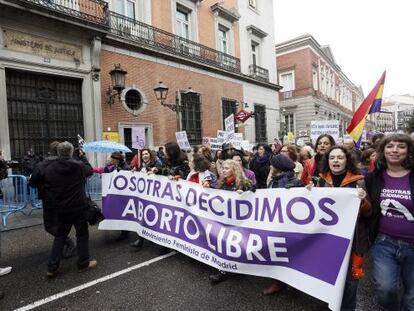Spanish justice minister resigns after failure of abortion law
Alberto Ruiz-Gallardón announces he will be leaving politics altogether following shelving of bill

Spanish Justice Minister Alberto Ruiz-Gallardón has announced his resignation not just from his ministerial position but from politics altogether.
“After 30 years in politics I am leaving,” the veteran Popular Party (PP) politician, who was mayor of Madrid between 2003 and 2011 and the region’s premier from 1995 to 2003, told a press conference on Tuesday. “My life now lies outside of politics.”
Ruiz-Gallardón, 55, had been widely expected to step down after the Cabinet on Friday failed to greenlight the abortion reform by the deadline he himself had set.
His announcement came just four hours after Prime Minister Mariano Rajoy confirmed that the legislation would be shelved, given that it had not found sufficient consensus to be moved ahead.
The highly controversial bill created an internal rift in the conservative PP and also attracted significant criticism from the opposition for taking Spain back 30 years in terms of abortion legislation.
I was convinced that this bill was going to go ahead until July”
But few analysts were prepared for the announcement that Ruiz-Gallardón would also give up his seat in Congress and all positions within the PP along with his ministerial post.
Speaking in calm tones that nevertheless belied an undercurrent of emotion, the conservative politician thanked everyone in his party for their support throughout his career and offered his apologies to any member of the opposition who might have felt slighted by any comments he had made over the years.
For months, Ruiz-Gallardón had vehemently supported a reform that would have eliminated abortion on demand in the first trimester and placed serious hurdles to pregnancy terminations in the event of serious and accredited fetal deformities.
During his address, he made a point of underscoring that abortion reform was initially a government project and that he was essentially putting it into action on the government’s behalf. “I was convinced that this bill was going to go ahead until July,” he said. “The preliminary bill was initiated by the Spanish government. I did what I honestly believed I had been tasked to do.”
The minister was so sure that the bill would reach the congressional stage that in July he told the media it would get Cabinet approval by the end of the summer. When this did not happen, rumors began to circulate about his likely resignation.
I am convinced that the debate that has opened up here on such a sensitive issue is a positive thing for Spain”
Gallardón had communicated his intention to resign to Rajoy several days ago after learning that the bill was to be definitively shelved. Rajoy tried to persuade him to carry on but under the condition that the abortion law would go no further, government sources told EL PAÍS. Gallardón is the first member of Rajoy’s Cabinet to resign of his own volition.
Political analysts believe that with elections coming up next year, top PP officials viewed the abortion issue as too controversial to risk losing votes. Several party heavyweights at the regional level had expressed concern that the reform would be bad for them at the polls as surveys showed that Spaniards did not seem to demand changes to the current abortion legislation, which was passed in 2010 by the previous Socialist administration.
Yet Ruiz-Gallardón on Tuesday denied feeling discredited in any way. “More than deprived of authority, I feel that I have not been capable of carrying out this assignment,” he said.
“In life, you have to be consistent,” he added. “I really wanted to tell PP voters and anyone else who believed in our project that this was going to be successful. But sometimes great achievements take longer than one thinks. And I am convinced that the debate that has opened up here on such a sensitive issue is a positive thing for Spain, despite the personal costs to myself.”
Tu suscripción se está usando en otro dispositivo
¿Quieres añadir otro usuario a tu suscripción?
Si continúas leyendo en este dispositivo, no se podrá leer en el otro.
FlechaTu suscripción se está usando en otro dispositivo y solo puedes acceder a EL PAÍS desde un dispositivo a la vez.
Si quieres compartir tu cuenta, cambia tu suscripción a la modalidad Premium, así podrás añadir otro usuario. Cada uno accederá con su propia cuenta de email, lo que os permitirá personalizar vuestra experiencia en EL PAÍS.
En el caso de no saber quién está usando tu cuenta, te recomendamos cambiar tu contraseña aquí.
Si decides continuar compartiendo tu cuenta, este mensaje se mostrará en tu dispositivo y en el de la otra persona que está usando tu cuenta de forma indefinida, afectando a tu experiencia de lectura. Puedes consultar aquí los términos y condiciones de la suscripción digital.









































